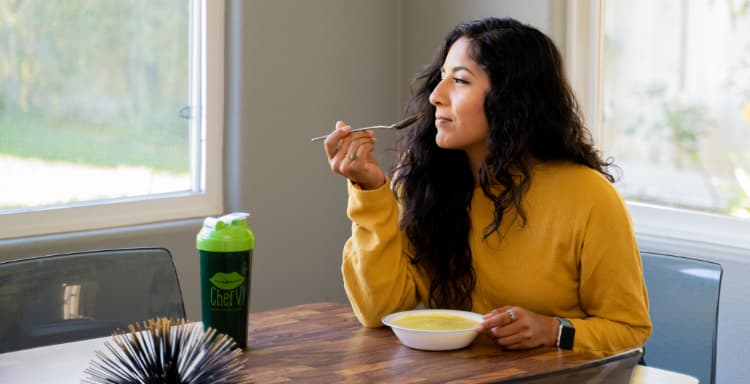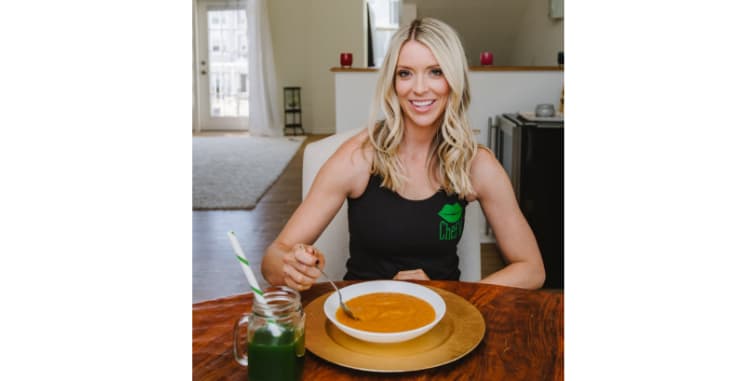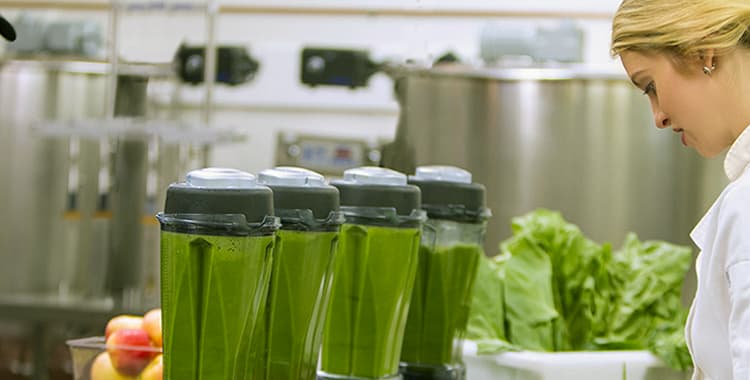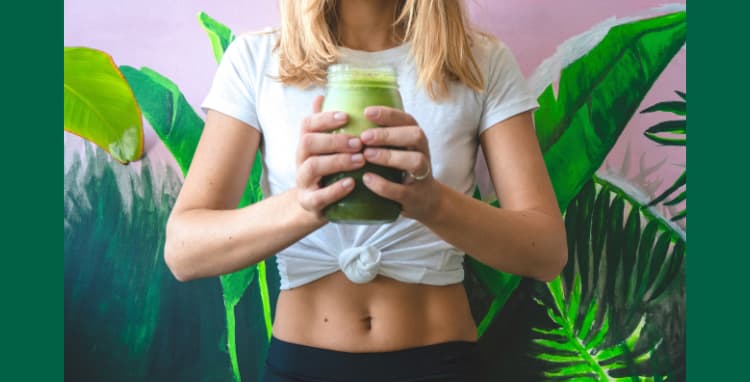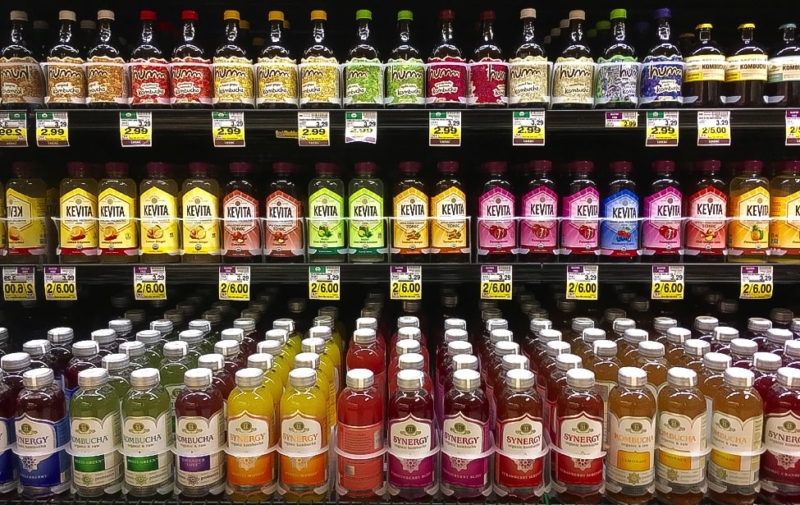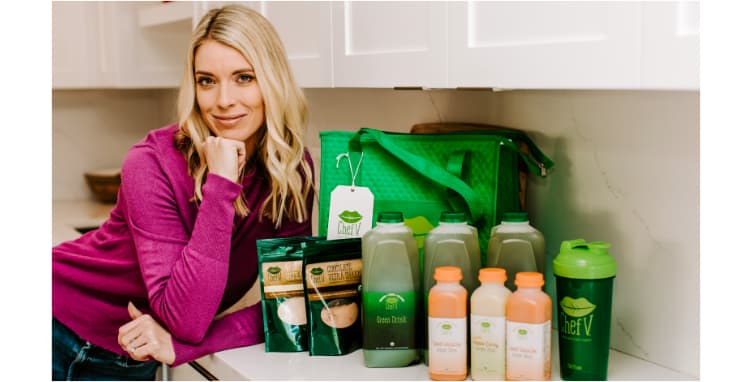Have you ever heard the saying, “a healthy mind lives in a healthy body?” The way Chef V founder Veronica “V” Wheat sees it, a healthy mind exists because of a healthy gut. But it’s not just mental health that’s linked to gut health. The immune system, cardiovascular health, skin appearance, and, of course, how you look in a swimsuit is all controlled by the health of your gut. So V is here to offer 5 easy tips to boost gut health.
Healthy Gut Makeover Tip #1: Take It Easy On The Kombucha
When it comes to improving gut health, some people think all it takes is drinking some kombucha.
But as I mentioned here, many brands of kombucha are just glorified sugar water. The major selling point of kombucha is that it’s loaded with probiotics. Probiotics just so you know are clinically-proven strains of bacteria that may offer health benefits. (Lactobacillus and bifidobacteria are two of the most common species of probiotics).
Forget the fact that the probiotic content in kombucha is hardly ever verified. So it’s hard to tell if you’re getting any of the friendly-bacteria boosting benefits of kombucha to begin with. Not to mention if you struggle with yeast infections, drinking kombucha is the last thing you want to do. That’s because chugging a whole bottle of it, as refreshingly bubbly as it may be, may cause harmful bacteria and yeast to grow in your gut.
So my first healthy gut makeover tip is don’t be fooled thinking that kombucha is a magical elixir. Instead, eat and drink other things that are fermented with beneficial bacteria that aren’t loaded with sugar like coconut yogurt, sauerkraut/kimchi, beet kvass, tempeh and miso.
#2: Probiotics
Popping probiotic pills might help improve gut health, then again it may not. Many brands of probiotics are low quality. So don’t buy the cheapest probiotic supplement you can find because you’ll just be throwing your money away.
The reason why is that in order to colonize in your large intestine (also called the colon), the friendly microorganisms have to travel through some dangerous territory: the stomach.
You can think of your stomach as a swimming pool filled with acid. Containing the lowest pH level in the digestive system, the stomach and its highly acidic juices help break the big bites of food you swallow into partially-digested morsels called chyme.
Chyme then passes into the small intestine where enzymes further break it down into amino acids and nutrients.
So the cards are stacked against probiotics surviving this harsh acidic environment. Only high-quality probiotics that are formulated to break down once they reach the relative safety of the intestines are worth paying for. But even if you splurge on a pricey probiotic, it doesn’t mean that you’re going to have the best gut makeover…
#3: No Added Sugar Diet
Taking a probiotic supplement and eating and drinking things with added sugars is like not flossing and expecting your dentist to tell you that your gums look great.
(By the way, you should be flossing every day because if you don’t, the unhealthy bacteria will take over in your mouth and possibly other organs—including your gut!)
Sure, taking a really good probiotic is better than not taking one and consuming lots of sugar. The problem is, you might think you’re not consuming that much added sugars because you don’t eat candy, drink soda or other typical junk foods. But food manufacturers are sneaky. They put added sugars into all kinds of things, from salad dressing to coffee creamer to salsa, pasta sauce, bread … you name it.
So start paying attention to food labels on every single item you purchase from a supermarket. This is especially true of anything that comes in a package or can.
Consuming sugar from natural sources like vegetables and fruit is fine. But added sugars are to your bad gut bacteria what gasoline is to a car. Excess sugar fuels the pathogenic, disease-causing invisible critters in your gut.
I’m a purist when it comes to this rule. If I even see that a product contains just one gram of added sugar, I won’t buy it.
#4: Take It Easy
Constantly being on the go is the American way. But that lifestyle is terrible for gut health. And remember, if it’s terrible for gut health, it’s bad for your overall health and wellness. There are a ton of research studies (like this one) that show a connection between excess bad stress and poor gut health. In order to have great gut health, your brain and gut need to have great communication, just like in a healthy marriage.
The problem with chronic stress is that it totally disrupts gut and central nervous system communication. And when that happens, your happy hormones and chemicals like serotonin won’t get activated.
Even if you have a super slammed schedule like yours truly, you must take the time to decompress from stress.
I like to take mini-meditation breaks. You can meditate even while you’re stuck in traffic. Instead of being annoyed that you didn’t make the light, take advantage of the situation by taking some slow deep breaths. Notice the plants and scenery around you. Don’t stare at the red light with nervous energy.
Do a 5-minute yoga routine a few times a day, take a walk during lunch. Knit, garden, do whatever it takes to chill out—in a healthy way.
#5: Sleep Like A Baby
Like the link between gut and brain communication, there’s been a lot of research lately on the association between sleep quality and gut health.
It’s easy to say get enough sleep but if you’re stuck in a vicious cycle of insomnia and poor sleep quality, what can be done?
I recommend meditating or doing deep, steady breathing at 9:00 at night for about 20 minutes. Then, take a warm bath with soothing, relaxing essential oils and bubble bath. You can also try drinking some chamomile tea and then get in bed with all electronics out of the room and your phone in airplane mode several feet away from you. If you’re still having trouble getting enough deep sleep after trying these tips, you may want to try a full-spectrum CBD oil or consult with a natural health professional.
Personally, I don’t think getting 8 hours of sleep is necessary. Not if you’re eating clean and drinking organic greens, managing your stress, getting plenty of movement activity during the day and having an attitude of gratitude.
I hope that these tips help you achieve a healthy gut makeover!
Love,
V
